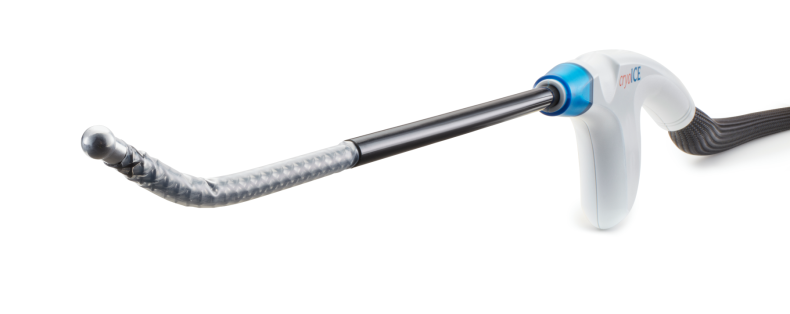The recovery process after open chest surgery can be challenging and it’s often associated with pain that requires medication. Patients find that, due to the pain resulting from the procedure, their ability to move can be limited afterwards, often requiring physiotherapy support to heal quickly.
To help improve recovery rates, Royal Brompton Hospital is proud to be the first UK provider to offer 6 months of pain relief for chest surgery patients in the form of cryotherapy. Mr Silviu Buderi, consultant thoracic surgeon at Royal Brompton Hospital, explains more about pain management and cryotherapy.
What is chest surgery?
Chest surgery (also called thoracic surgery) covers a range of procedures carried out on any organ in your chest. This includes your heart, lungs, oesophagus (food pipe), trachea (windpipe), chest wall and diaphragm.
Open chest surgery sometimes involves a large incision being made in the chest in order for the surgeon to access the areas which need operating on. It’s this large incision and the complex and vast nervous network that can make the recovery process longer than other minimally invasive chest surgeries.
Mr Silviu Buderi, consultant thoracic surgeon at Royal Brompton Hospital, specialises in chest surgery with a particular expertise in lung cancer surgery. He says, “even though there have been significant advancements in the surgical techniques used in recent years, patients often find recovery after open chest surgery challenging due to the size of the incision.”
Pain management options after chest surgery
Pain after chest surgery can be caused by tissue trauma, nerve irritation and your body’s natural inflammatory response to surgical intervention. More traditional ways to treat pain after surgery typically include local anaesthetic (pain relief targeted at the affected area only), painkillers in tablet form, or painkillers administered through an intravenous (IV) drip or by injection.
Although these options are forms of pain management which do work, Mr Buderi explains “these medications can have side effects, may be addictive, and might not provide enough pain relief for patients who are suffering with severe pain.”
To reduce the need for these more traditional forms of pain management in chest surgery patients, we’re proud to offer cryotherapy at Royal Brompton Hospital. As the first centre in the UK to offer this cutting-edge approach, we’re committed to providing effective pain relief by preventing post-surgery pain from the outset.
What is cryotherapy?
Cryotherapy is a medical technique that relies on applying very cold temperatures to painful areas to help reduce pain. ‘Cryo’ refers to anything involving extreme cold temperatures, while ‘therapy’ describes treatment designed to relieve or heal a disorder – so cryotherapy does exactly what its name suggests.
It’s well-known that applying cold temperatures to painful areas can help to reduce discomfort, and most people will have done this in situations where they use an ice pack or cold compress on an injury. Cryotherapy simply takes this theory a step further and uses a specialised probe to apply very cold temperatures to the painful area, providing the same numbing effect on a more specialised level.
How does cryotherapy work?
Cryotherapy targets pain and inflammation directly, rather than painkillers taken by mouth or IV drip which aren’t as direct. In cryotherapy, cold temperatures are applied directly to the nerves in the painful area. This temporarily shuts off the affected nerves which transmit pain signals, numbing the affected area, reducing nerve activity and constricting the blood vessels, which minimises pain and swelling.
The cryotherapy treatment works by delivering very cold temperatures to pain nerves in your chest which temporarily freezes the protective layer (called the ‘myelin sheath’) around the nerves. This prevents them from transmitting pain signals to your brain. Over a period of 6 months to 1 year, the protective layer heals which allows the nerves to transmit pain signals to your brain again. By this time, the post-surgery pain in the affected area is usually no longer there.
How is cryotherapy applied?
Cryotherapy can be used on anyone, but Mr Buderi explains, “it’s particularly beneficial for high-risk, complex patients, or patients who have had a large incision made during their chest surgery.” Mr Buderi also recommends cryotherapy to patients with a history of heart disease as well-controlled pain helps to reduce stress on their hearts, minimising the risk of complications after surgery.
Freezing the nerves prevents pain signals from reaching your brain. The cold temperatures used to do this are administered through a specialised probe which applies nitrous oxide directly onto the nerves in the affected area. The probe reaches temperatures as cold as -70 degrees Celsius and the adjustable tip on the probe ensures that application is very precise.
The process of applying cryotherapy with the specialised probe takes around 15 minutes and it’s done during your chest surgery. You can expect to feel the effects of the pain relief between 12 to 24 hours after it has been administered. The treatment has been designed to provide pain relief for 6 months but some patients say that the effects last even longer than this.

Specialised cryotherapy probe (cryoICE® cryoSPHERE™ probe (AtriCure, Inc)) uses nitrous oxide to administer cold temperatures directly to the nerves involved in pain perception
What are the benefits of cryotherapy?
Cryotherapy has several benefits for chest surgery patients, with the first and most obvious benefit being enhanced pain relief. As the treatment provides effective pain relief, you’re less likely to require medications like opioids which are often associated with dependency issues. In fact, a study which looked at 50 patients showed a reduction in consumption of morphine and restoration of respiratory function after surgery.
Inflammation occurs as a natural response to any surgery, but cryotherapy helps to control this, minimising the chance of tissue damage and therefore reducing the length of your surgery recovery. By reducing inflammation and blood flow to the affected area, your risk of tissue damage after chest surgery is also reduced.
At Royal Brompton Hospital, the average stay after chest surgery when cryotherapy is administered is just four days. Without cryotherapy, the average stay can be as much as 14 days. This difference truly highlights the improvement in patient recovery when cryotherapy is used to manage pain and inflammation after chest surgery. Not only are you able to go home sooner, but you’re able to return to work and daily activities quicker too, which Mr Buderi regularly witnesses in his own patients who have had cryotherapy.
Further to this, the opioid medications which are usually given to patients after surgeries as a form of pain relief are associated with a host of common complications. These can include side effects such as slower, shallower breathing and constipation, which don’t occur after cryotherapy. As the treatment is administered in one go during surgery and is non-pharmacological (not based on medication), there is no opportunity for dependency to develop.
Cryotherapy is available at Royal Brompton Hospital for patients who are due to undergo open chest surgery, both minimally invasive and open.
To learn more about the treatment and to book it in conjunction with your chest surgery, please contact our customer services team.
Related content
-
Cardiology
Our specialists are continuously innovating in minimally invasive cardiology procedures and improving care delivery.
-
Pain and thoracic surgery: A promising frontier in cryotherapy
-
Thoracic surgery
Our surgeons continuously advance minimally invasive techniques in thoracic surgery, including for lung cancer, COPD and chest deformities.
